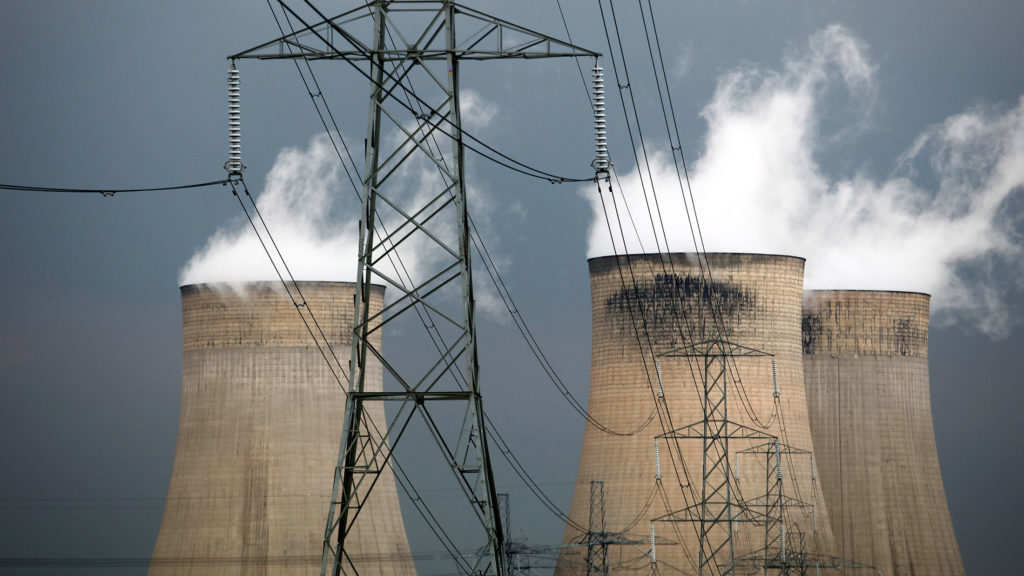
The 22 billion-euro ($27.1 billion) deal that’s shaking up the world of German utilities also has a very British dimension.
EON SE’s acquisition of Innogy SE will combine the two U.K. business they own, shrinking the country’s Big Six utilities to five at a time when both the government and main opposition party are pressing for lower bills. It also emphasizes Britain’s dependence on foreign companies for power and natural gas when it’s seeking to leave the European Union.
Britain has several nuclear and coal power plants due to finish their life in service in the next decade. That leaves the government seeking to balance the need for 100 billion pounds ($139 billion) of investment in its power system against voter demands for lower energy costs. EON and Innogy’s tie-up would be the biggest shakeup of energy suppliers in the U.K. in at least a decade.
“The fate of the U.K. customer businesses is in question,” said Meredith Annex, analyst at Bloomberg New Energy Finance. “Having a few larger players with more power creates political concerns in an already sensitive market.”
The U.K. government said consumers have more choice than ever before and that it remains “committed to tackling the cost of consumers’ energy bills,” according to a statement from the Department of Business, Energy and Industrial Strategy. “This will increase fairness in the market.”
The deal, involving a complex asset swap with Innogy’s chief shareholder RWE AG, raises a number of questions for the U.K. Those include:
Centrica’s Position
Centrica Plc is Britain’s biggest energy supplier, and no matter what happens it will be facing a bigger competitor, Annex said.
Since 2014, the U.K. government has focused on increasing competition between energy suppliers following concerns that utilities were using their market power to boost consumer prices. While about 60 suppliers serve Britain, the biggest six companies still feed about 80 percent of households.
Others in the Big Six include Electricite de France SA, SSE Plc and Iberdrola SA’s ScottishPower business.
Npower’s Future
Innogy works in the U.K. through its Npower unit, which has been losing money. In November, Innogy struck a deal to combine its retail operations with those of fellow Big-Six member SSE.
It’s not yet clear whether that deal will move ahead if EON and Innogy succeed in their plan. SSE issued a statement saying it didn’t think the Npower deal would be affected.
“If the retail merger remains intact, EON’s ownership of Npower could make obtaining the necessary regulatory clearance more complex,” said Ahmed Farman, equity analyst at Jefferies International Ltd.
Market Clout
One possibility: EON, Npower and SSE could all merge their customer businesses. That would leave them with 37 percent of the market, making them by far the biggest supplier, according to BNEF data. U.K. competition authorities may feel compelled to investigate if the combined share surpasses 25 percent.
The other options are for SSE to abandon the deal or let it go ahead as planned. If it goes ahead, Innogy may have to sell its 34 percent stake in the new company formed by Npower and SSE, according to RBC Europe Ltd.
Competition Authorities
Another fraught issue is who exactly should oversee the anti-trust investigation into the EON-Innogy deal. The European Commission is a natural candidate because of the size of the deal and since the utilities have operations across Europe.
It could also be German and British officials through the U.K. Competition and Markets Authority that seek a role in the deal. The CMA has already started a probe into the SSE-Npower merger. U.K. officials may feel compelled to act with Britain due to leave the EU in March 2019, even though the EC at the moment seems the more natural regulatory venue.
The EC “examines mergers of businesses with EU and global turnover above a certain size, including those that may have an impact in the U.K.,” the CMA says on its website. The antitrust watchdog is talking to both companies and looking into the implications of the deal.
Processing the case could take more than a year, and that timetable would run parallel to the U.K. government’s negotiation with the EU over an energy trade relationship outside the union.
A German national champion with such a big influence over the U.K. energy market could make some politicians uncomfortable, though none have spoken out yet.
“Given the political influence over energy policy recently, I wouldn’t be surprised if politicians try to get involved in this deal,” said Elchin Mammadov, analyst at Bloomberg Intelligence. “The U.K. energy sector has been attracting foreign investors for some time without issue so it may be more political rhetoric than action.”
Recommended for you
